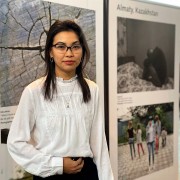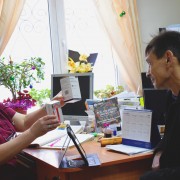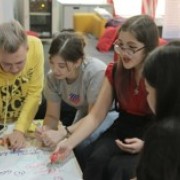Speeches Shim

The COVID-19 pandemic has only exacerbated the dangers to at-risk groups as migrants have become stranded along borders or in foreign countries without work and resources. Many people have not been able to travel for seasonal work or to travel to locations with more opportunities. This puts people, like Razia, at high risk for exploitation. Traffickers take advantage of the lack of knowledge and desperate situation many have found themselves in due to the pandemic. Responding to the COVID-19 pandemic and related travel restrictions, the USAID-funded Safe Migration in Central Asia project is working to provide migrants with information to protect themselves and avoid potential exploitation.

USAID’s Kazakhstan Media Campaign Addresses Stigma Associated with Tuberculosis During COVID-19
When the Government of Kazakhstan declared a state of emergency on March 15, 2020 due to confirmed cases of COVID-19, many organizations, factories, and businesses suddenly had to suspend their operations. The fear of getting sick and possibly dying of COVID-19, as well as movement restrictions instituted by the government, has had a negative impact on other important public health programs.

The media and civil society community in Kazakhstan secured a significant victory in early 2019: the government dropped discriminatory and stigmatizing provisions against the lesbian, gay, bisexual, and transgender (LGBT) community from the draft bylaws under a newly adopted access to information-related law in Kazakhstan. This was due in large part to advocacy efforts of the USAID-funded Access to Information Program.

The U.S. government, through the U.S. Agency for International Development (USAID) has committed approximately 365 million tenge (more than $800,000) to support Kazakhstan’s efforts against the COVID-19 pandemic.

With misinformation increasingly spread through digital media, the USAID-funded Access to Information (A2I) Program is committed to helping audiences in Central Asia understand how to discern true information from false. As young people most actively use digital media for communication and information consumption, they are a key target group.
In February and March 2019, the Access to Information program partnered with U.S. Embassies and the American Corners in Kazakhstan and Tajikistan to deliver a training of trainers to volunteer citizens. The goal was to develop a pool of young media literacy trainers who could then provide practical sessions on media and digital literacy, critical thinking, and fact-checking exercises to interested audiences in their home communities.

Comment
Make a general inquiry or suggest an improvement.